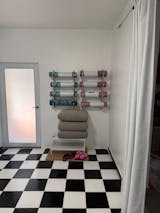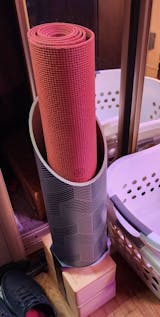At Mache, our mission is to provide our community with the knowledge and tools they need to make mindful and informed choices in their self-care journey. In a world where wellness and eco-consciousness have taken center stage, it's essential to be aware of healthwashing scams that can deceive us into thinking we're making healthier choices with our buying power.
So, what exactly is "Healthwashing"?
Healthwashing is a deceptive marketing practice wherein products are dressed up as health-conscious or eco-friendly, while in reality, they may be harmful to both our well-being and the environment. In this article, we'll delve deeper into the top five healthwashing scams to avoid in your self-care spaces and healthy lifestyle, and we'll shed light on the implications of falling for these misleading claims.

1 | "Sustainable Plastic" Yoga Mats
In the quest for good physical and mental health, millions are turning to yoga and other mat-based practices. As health-conscious consumers, many yogis assume yoga gear will be non-toxic and aligned with their values. Sadly, these is not the case and most yoga and fitness products are made of toxic chemical compounds, a.k.a. plastic.
The $20 cheap plastic yoga mats are being made of one of the world's most toxic materials, Polyvinyl Chloride or PVC. And more recently, many major yoga mat manufacturers have pivoted to TPE, or Thermoplastic elastomer, to capitalize on the green product movement by advertising it as the "eco-friendly plastic" yoga mat alternative.
Despite this misleading label, all plastic yoga props are still made with non-biodegradable chemicals, with serious longterm environmental implications. Moreover, plastic yoga gear contains harmful chemicals like phthalates and BPA, posing health risks during your practice when you are most vulnerable (perspiring and breathing deeply). The healthwashing of "eco-friendly plastic" deceives us into compromising both the planet and our well-being.
To embrace genuine sustainability, opt for yoga mats and props made from biodegradable materials like natural rubber, cork, wood or organic cotton. These eco-conscious alternatives not only ensure a safer practice but also contribute to reducing plastic pollution and conserving natural resources.

2 | "Eco-Friendly" Recycled Plastics
While the idea of using recycled plastic in products is a step towards sustainability, healthwashing often underplays the reality. All products boasting "recycled plastic" content contain only a small percentage of genuine recycled material, at best up to 20%, with the remaining majority being virgin plastic. This deceptive practice undermines the true intention of consumers to support recycling and reduces the overall positive impact on the environment. On top of that, as you sweat and breathe deeply, the micro-plastics found in recycled plastic clothing can leach into the blood stream, causing potential skin irritation, as well as gut, hormonal, and nervous system imbalances. With each laundering, these same fabrics then devastate our oceans with microscopic plastic pollution. Limit using recycled plastics to items that require little to no laundering, will not be used to ingest food, drink or medicine, and will not be placed directly against the skin, such as luggage, sporting equipment, or outdoor furniture.
To avoid falling for this healthwashing scam all together, embrace brands committed to authentic sustainability practices that minimize plastic usage and support circular economies. Choose natural apparel made from organic cotton, bamboo, hemp or other sustainable fiber, and prioritize the well-being of yourself and the whole planet family.

3 | Aromatherapy
Aromatherapy is a common self-care practice beloved by many, however health-washing in this area is wide-spread and can be very dangerous. Most candles on the market today, as well as some essential oils and incense, are made with hidden synthetic fragrances and chemical additives. When burned, these petroleum-based substances release harmful volatile organic compounds (VOCs) into the air, contributing to indoor air pollution and potential health issues like headaches and respiratory problems.
To create a genuinely therapeutic environment, prioritize brands that provide full transparency about their ingredients. Seek products scented with pure, organic essential oils and natural fragrances, ensuring a safe and authentic aromatherapy experience without compromising your health.

4 | EMF Blockers
In an increasingly connected world, concerns about electromagnetic fields (EMFs) are on the rise. Healthwashing may lead to the promotion of certain products as natural EMF blockers, without solid scientific backing to support their efficacy. Be sure to look for third-party lab-testing results on all EMF-blockers, prior to purchase. If you'd like to know how your home, workplace, and devices measure in terms of EMF radiation exposure, we recommend you purchase a hand-held EMF meter and see where you could use some protection.
Intriguingly, effective EMF blockers are also believed to be available to us in the natural world. In fact, cacti were once studied by NASA for their ability to absorb some EMF radiation, but their effectiveness may be limited due to EMF's directional nature. Additionally, some have found certain crystals to be effective EMF protection tools, such as the Shungite crystal, known for its unique composition, which is believed to absorb and neutralize EMF radiation. Combining Shungite with other scientifically-backed methods, like lab-tested EMF blocking phone cases and protective clothing, ensures a more comprehensive approach to reducing EMF exposure.

5 | Wearable Fitness Technology
Wearable technology, like fitness trackers and smartwatches, has become exploded in the fitness and self-care space, offering a new level of data collection and insights into our health and daily activities. However, this industry is not immune to healthwashing tactics, where some devices may make bold claims about health benefits without sufficient scientific evidence.
A Critical Note on Wearable Tech and Sleep: One of the most crucial times to avoid wearable tech is during sleep. This is when the potential impact of EMF radiation on our health is at its peak. As we sleep, our bodies are hard at work repairing and rejuvenating our internal systems. This makes it an essential time to ensure a calm, radiation-free environment. The continuous exposure to EMF radiation from wearable devices can interfere with this natural repair process. Therefore, it's advisable to take off your fitness jewelry and trackers when you sleep. Instead of relying on tech to monitor your sleep quality, consider embracing post-sleep self-reflection and journaling. This not only reduces potential radiation exposure but also encourages a more mindful connection with your body's natural rhythms.
To make genuine strides in your well-being, choose wearable devices from reputable brands that back their claims with rigorous research and certifications. Look for devices with FDA approvals or other regulatory certifications, ensuring reliable health data that supports your self-care journey.
In the pursuit of authentic self-care, being vigilant against healthwashing is essential. At Mache, we believe in empowering our community with accurate information to make conscious choices that align with both personal well-being and environmental sustainability. By avoiding healthwashing scams, we protect ourselves from potential harm and contribute to a healthier planet. Let's prioritize genuine self-care practices, embrace eco-conscious alternatives, and lead with authenticity and mindfulness. Together, we can create a truly holistic self-care space that nurtures our well-being and preserves the beauty of our natural world.
Delve deeper into the dangers of "healthwashing" by catching up on our interview with Dr. Meg Christensen from Interior Medicine:



















